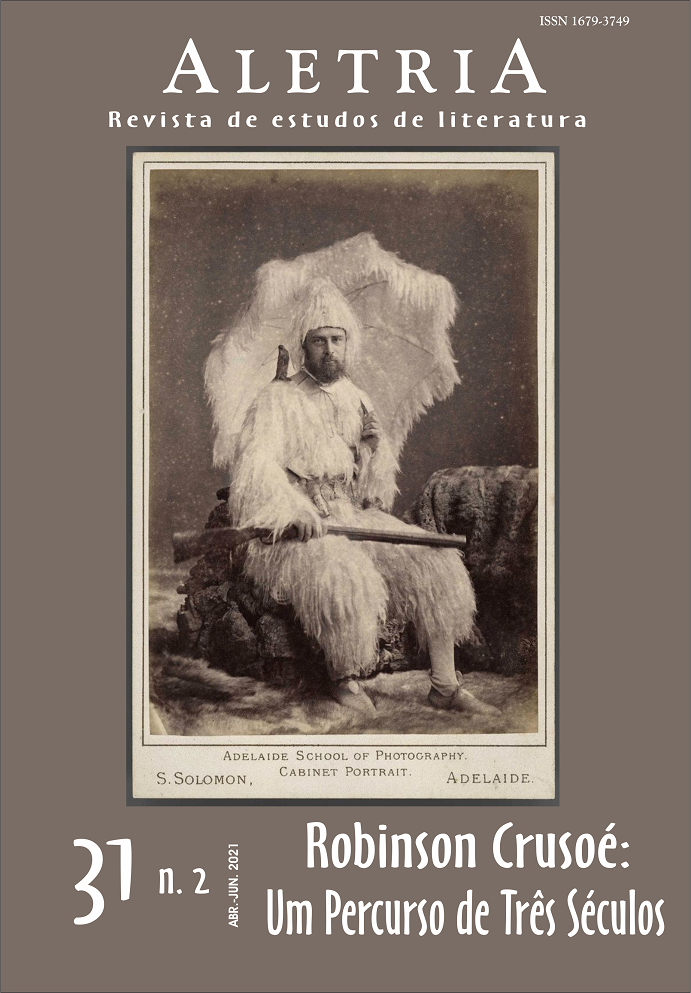“Energy of Words”
Language and Dominance in Robinson Crusoe and in Foe
DOI:
https://doi.org/10.35699/2317-2096.2021.26194Keywords:
Robinson Crusoe, Foe, Language, Formal realism, ColonialismAbstract
This paper aims at investigating the role of language in Robinson Crusoe and in Foe. In the latter, relations of dominance are undermined by the near absence of verbal communication between Cruso and Friday, who is speechless, allied with the failure of the character and narrator, Susan Barton, in weaving a plot to her story; in the former, the character and narrator skillfully manipulates verbal signs so as to attribute a new meaning to the desert island, thus taking control over it, similarly to the dominion he will exercise over its inhabitants, mainly Friday. Therefore, in this paper, I aim at connecting some dots between the descriptive and denotative use of language, proper to the formal realism of Robinson Crusoe, and the colonial mission. Likewise, in putting referential language itself at stake, Foe offers an original and challenging alternative to the possibilities of opposing colonial heritage and its narrative forms.
Downloads
References
BONOMO, Daniel. Experimentum in Insula: Robinson Crusoé nas origens do aborrecimento. Revista Literatura e Sociedade, São Paulo. v. 22, n. 25, p. 117-131, 2018. DOI: https://doi.org/10.11606/issn.2237-1184.v0i25p117-131.
COETZEE, John Maxwell. Foe. Tradução de José Rubens Siqueira. São Paulo: Companhia das Letras, 2016.
DEFOE, Daniel. Robinson Crusoé. Tradução de Sergio Flaksman, Introdução e notas de John Richetti. São Paulo: Penguin; Companhia das Letras, 2012.
HILL, Christopher. O Mundo de Ponta Cabeça: ideias radicais durante a Revolução Inglesa de 1640. Tradução de Renato Janine Ribeiro. São Paulo: Companhia das Letras, 2002.
JUNG, Sandro. The language(s) of hierarchy in Daniel Defoe’s Robinson Crusoe. Nordic Journal of English Studies. Oslo, v. 2, n. 2, p. 265-277, 2003. DOI: https://doi.org/10.35360/njes.137.
KEYMER, Thomas. Introduction. In: DEFOE, Daniel. Robinson Crusoe. Edited with an Introduction by Thomas Keymer. Oxford: Oxford University Press, 2008. DOI: https://doi.org/10.1093/owc/9780199553976.001.0001.
LOCKE, John. Ensaio sobre o entendimento humano. Tradução de Pedro Paulo Garrido Pimenta. São Paulo: Martins Fontes, 2012.
MCKEON, Michael. The Origins of the English Novel 1600-1740. Baltimore: The John Hopkins University Press, 1987.
MONTEIRO, Daniel. No limiar da visão: a poética do sublime em Edmund Burke. São Paulo: LiberArs, 2018.
NAIPAUL, Vidiadhar Surajprasad. Columbus and Crusoe. In: GROSS, John. The Oxford Book of Essays. Oxford: Oxford University Press, 1991. p. 656-659.
NOVAK, Maximillian E. Friday: or, the power of naming. In: RIVERO, Albert J. Augustan Subjects: Essays in Honor of Martin C. Battestin. Newark: University of Delaware Press, 1997. p. 110-122.
RICHETTI, John. Defoe as narrative innovator. In: RICHETTI, John. The Cambridge Companion to Daniel Defoe. Cambridge: Cambridge University Press, 2008. p. 121-138. DOI: https://doi.org/10.1017/CCOL9780521858403.008.
RICHETTI, John. Introdução. In: DEFOE, Daniel. Robinson Crusoé. Tradução de Sergio Flaksman, Introdução e notas de John Richetti. São Paulo: Penguin/Companhia das Letras, 2012.
SAID, Edward W. Cultura e Imperialismo. Tradução de Denise Bottmann. São Paulo: Companhia de Bolso, 2017.
SEIDEL, Michael. Robinson Crusoe: Varieties of Fictional Experience. In: RICHETTI, John. The Cambridge Companion to Daniel Defoe. Cambridge: Cambridge University Press, 2008. p. 182-199. DOI: https://doi.org/10.1017/CCOL9780521858403.011.
SHAKESPEARE, William. A tempestade. Tradução de Barbara Heliodora. Rio de Janeiro: Editora Nova Fronteira, 2011.
SPIVAK, Gayatri Chakravorty. The Theory on the Margin: Coetzee’s Foe Reading Defoe’s Crusoe/Roxana. English in Africa. Makhanda, v. 17, n. 2, p. 1-23, 1990.
STEELE, Richard. Alexander Selkirk, The Englishman. New York: Brooklyn College, 2013. Disponível em: http://academic.brooklyn.cuny.edu/english/melani/novel_18c/defoe/selkirk.html. Acesso em: 1 nov. 2020.
WATT, Ian. A ascensão do romance: estudos sobre Defoe, Richardson e Fielding. Tradução de Hildegard Feist. 2 ed. São Paulo: Companhia das Letras, 2007.
WATT, Ian. Myths of Modern Individualism: Faust, Don Quixote, Don Juan, Robinson Crusoe. Cambridge: Cambridge University Press, 1996. DOI: https://doi.org/10.1017/CBO9780511549236.
WEBER, Max. A ética protestante e o espírito do capitalismo. Tradução de José Marcos Mariani de Macedo. São Paulo: Companhia das Letras, 2012.
Downloads
Published
How to Cite
Issue
Section
License
Copyright (c) 2021 Daniel Lago Monteiro (Autor)

This work is licensed under a Creative Commons Attribution 4.0 International License.
Authors who publish with this journal agree to the following terms:Authors retain copyright and grant the journal right of first publication with the work simultaneously licensed under a Creative Commons Attribution Non-Commercial No Derivatives License that allows others to share the work with an acknowledgement of the work's authorship and initial publication in this journal.Authors are able to enter into separate, additional contractual arrangements for the non-exclusive distribution of the journal's published version of the work (e.g., post it to an institutional repository or publish it in a book), with an acknowledgement of its initial publication in this journal.Authors are permitted and encouraged to post their work online (e.g., in institutional repositories or on their website) prior to and during the submission process, as it can lead to productive exchanges, as well as earlier and greater citation of published work (See The Effect of Open Access).





